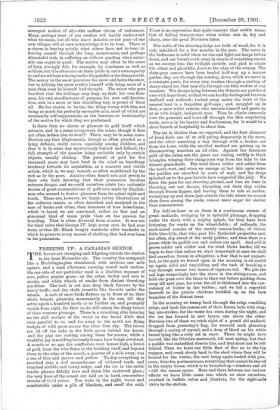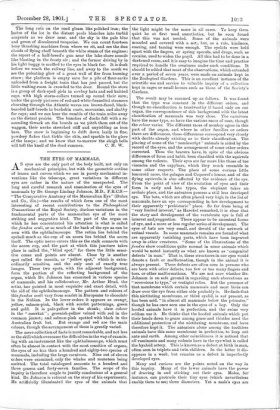FREEZING UP: A CANADIAN SKETCH.
THE horses are stamping and fidgeting outside the station in the keen November air. The country lies outspread like a Brobdingnagian chessboard, with sections one mile square, and a road allowance running round each section. On one side of our particular road is a limitless expanse of sere, yellow prairie grass; on the other, barley and oats in stooks, and white whorls of smoke from distant threshing machines. The trail is cut into deep black furrows by the heavy traffic, and the clods crumble like biscuits under the wheels. A mob of snow-birds flutters up in front of us, their white breasts gleaming momentarily in the sun, till they settle again a hundred yards or so further on, and promptly vanish from sight, for their backs still retain the dingy brown of their summer plumage. There is a wrinkling skin forming on the still surface of the water in the broad ditch that runs parallel to us, and far away to the north are flying wedges of wild geese across the clear blue sky. The leaves are all off the oaks in the little grove behind the house, and the pigs are rooting among them for acorns, while a wrathful jay is scolding furiously from a bare bough overhead. A month or so ago the sunflowers were breast high, a forest of gold, from the wire fence to the building itself, and beyond them to the edge of the marsh, a quarter of a mile away, was a sea of blue and mauve and yellow. To-day everything is scorched into a dull monochrome of withered reeds and bleached stubble and tawny sedge, and the ice in the cattle tracks gleams fitfully here and there like shattered glass ; the very hues of the sunset are laid on in hard, remorseless streaks of vivid colour. You wake in the night, warm and comfortable under a pile of blankets, and smell the cold.
There is no expression that quite conveys that subtle sensa- tion of falling temperature when winter sets in, dry and sharp, near the great Northern lakes.
The walls of the shooting-lodge are built of wood, for it is only inhabited for a few months in the year. The water in the bedrooms is solid when we rise and light our lamps before dawn, and our breath curls away in clouds of wreathing smoke as we emerge into the twilight outside, and plod in single file, silent and ghostlike, down to the edge of the swamp. The slaty-grey canoes have been hauled half-way up a narrow gutter, dug out through the muskeg, down which we move in a constant panic, for every step crashes through a coating of sharp-edged ice, that may slip through our thin waders at any moment. The decoys lying between the thwarts are powdered over with hoar-frost, so that we can hardly distinguish between mallard and redhead ; tucked away under the bows of the nearest boat is a forgotten golf-cape; and, snuggled up in that, a snow-white ermine, who uncurls himself and gazes up at us with bright, indignant eyes. Then he climbs sinuously over the gunwale, and trots off through the thin crepitating reeds, secure in his beauty and fearlessness, for it would be a sheer breach of hospitality to shoot him.
The ice is thicker than we expected, and the first shimmer of dawn finds one of us still poling desperately in the stern, and the other smashing a way through with a broken oar from the bows, while the startled mallard are getting up in disconcerting numbers on all sides. Against the luminous gold of the rising sun the geese are cutting swiftly in black triangles, winging their clangorous way from the lake to the distant grain-fields. The wind blows colder and colder from the north-west, and when we emerge at last into open water the paddles are sheathed in coats of mail, and the drops splashed on to the gun-barrels have congealed like jelly. We force the pace for our shooting ground, and lose no time in throwing out our decoys, threading out their tiny cables through frozen fingers, and leaving them to ride at anchor, curtseying up and down just outside the tide where we crouch close down among the reeds, almost more eager for shelter than concealment.
For half-an-hour or so there is a continuous stream of great mallards, swinging -by in splendid plumage, dropping under the shots with a mighty splash, for they have been fattening for weeks on the wheat-fields ; of redheads, the snub-nosed cousins of the stately canvas-backs; of vicious little blue-bills, that whiz past like feathered projectiles and, too often, slip ahead of the tardy pellets; and then there is a pause while we paddle out and collect our spoil. And still it grows colder and colder and the wind blows harder, till we begin to fear that unless we start homeward at once we shall find ourselves frozen in altogether, a fear that is not unjusti- fied, as the path we forced open in the morning is all sealed up again, solid and unyielding, and the task of breaking a way through means two hours of vigorous toil. We pile the oak logs unsparingly into the stove in the sitting-room, and hold our guns over the blaze to thaw out before packing them away till next year, for even the oil is thickened into the con- sistency of butter in the bottles ; and we bid a regretful farewell to the prairie chickens huddled up on the bare branches of the distant trees.
In the morning we tramp back through the crisp, crackling sedge, and back the canoes out of their frozen beds with ring. in.g axe-strokes, for the water has risen during the night, and the ice has formed in new layers, one above the other. Between two of these we catch sight of a grand old mallard, dropped from yesterday's bag, his emerald neck gleaming through a casing of crystal, and a drop of blood on his white breast lying like a ruby set in snow. There he might have tarried, like the Siberian mammoth, till next spring, but that a paddle was embedded close to him, and that must not be left behind. Then we hoist our little fleet of five on to the big waggon, and creak slowly back to the shed where they will be housed for the winter, the cart being again loaded with gun- cases, bicycles, portmanteaus, everything that cannot be stored in the empty house, which is to be nailed up—windows and all —till the season opens. Here and there between our various effects we leave little oases into which we stow ourselves, swathed in buffalo robes and ,blankets, for the eight-mile drive to the station. The long ruts on the road gleam like polished iron; the lustre of the ice in the distant pools blanches into turbid soapsuds as we draw near, and the sky is the pale blue and green of discoloured turquoise. We can count fourteen busy thrashing machines from where we sit, and see the dun clouds of flying chaff beneath the white steam of the engines; the report of a half-breed's gun near the lake shore sounds like blasting in the frosty air ; and the farmer driving by in his light buggy is muffled to the eyes in black fur. It is dusk before we reach the railway line, and away to the south we see the pulsating glow of a great wall of fire from burning straw ; the platform is empty save for a pile of flour-sacks unloaded from a freight train that has just passed, but the little waiting-room is crowded to the door. Round the stove is a group of dark-eyed girls in cowboy hats and red knitted caps, with high storm-collars turned up round their ears; under the gaudy pictures of red-and-white-funnelled steamers churning through the Atlantic waves are brown-faced, black- bearded half-breeds in buckskin coats, moccasins, and shabby fur caps; and we can hear the rumble of the train miles away on the distant prairie. The bunches of ducks fall with a re- sounding thwack on the boards as we pitch them out of the waggon, their necks stretched stiff and unyielding as iron bars. The snow is beginning to drift down lazily in fine, powdery flakes that tickle the skin, and sparkle in the glare of the lamps ; and we know that to-tnorrow the sleigh bells
will toll the knell of the dead summer. C. H. W.



































 Previous page
Previous page